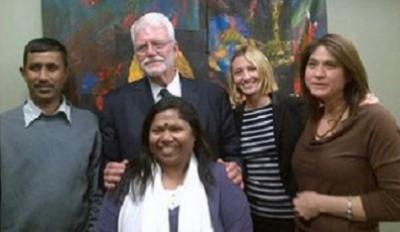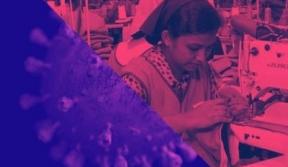
The crisis in the Bangladesh Apparel industry is really a women’s issue and something all advocates of women’s rights and equality should be deeply concerned about. To be clear, we are not talking here about individual cases of discrimination at work and the need for more equitable labor justice – although there is a need for improving that as well.
Our focus here is on systemic, society-wide discrimination and development strategies that have further entrenched that discrimination. These issues echo around the world in industry after industry built primarily on women’s labor. But they have been brought into stark relief in Bangladesh, where more than 1,200 workers – most of them women – have died during the last year due to negligence and disregard for their welfare.
Bangladesh has industrialized at an incredibly rapid rate and its garment industry is the second largest exporter in the world after China. The Bangladesh apparel sector employs 4 million workers and accounts for 80% of the country’s exports; 85% of the workers are women.
Growing the apparel industry has been so important for Bangladesh; yet there are laws on the books designed to minimize workers’ organizing for better wages, benefits, and working conditions. These limit workers’ ability to speak up. And because the industry disproportionately employs women, women’s ability to participate in society is disproportionately limited.
So although some development economists argue that bringing women into formal sector employment is good for development, they are not necessarily looking at whether or not these women are able to develop to their full potential as a result. I got my start working on women’s rights in the Mexican Maquiladoras, where some similar issues prevailed:
- Women’s role at work changed, but their role in society remained subservient, creating the double work-day;
- women found that income brought them certain liberties, but violence against women increased;
- there were significant increases in single-women headed households in maquila dominated cities like Ciudad Juarez;
- community break downs; and
- youth violence emerging as a result of idle youth with too little parental guidance.
In Bangladesh, we are at a critical juncture. We hope to work with allies in Bangladesh and around the world to find ways to leverage this moment and continue reshaping development policies to view women’s rights as an end, not a means to development.
The tragedies of the past year – which have cost the lives of 1,500 workers in Pakistani and Bangladeshi apparel factories – have been a wake-up call for the apparel industry and there is real impetus for change.
ILRF and our allies – BCWS, CCC, and WRC – have been documenting these tragedies since the Spectrum factory collapse killed 64 Bangladeshi workers in 2005. In case after case, workers have told us how their concerns were disregarded, even when they smelled smoke or saw cracks in the wall. One woman we’ve met, Nazma, broke her back jumping from a third-floor window at Tazreen. She saw her manager locking the gate to the exit on her floor. She reached through and grabbed him by the collar, beseeching him to unlock it, but he pulled away, even as the smoke was coming onto their floor. The mother of three, Nazma has already had to pull her 14-year-old son out of school to work because the little compensation she got was wiped out by medical expenses. She is one of thousands with a similar story.
We have the attention of development aid agencies and global apparel brands from around the world, but many of them are focused on the need for a technical fix; they are hiring more auditors and more trainers, but not changing their overall approach. They are talking about ‘worker-centered’ solutions, but not necessarily about ‘worker-driven’ solutions. We need to put workers in the driver’s seat so they have a role in deciding the improvements and safeguards needed as well as in the governance and implementation level of inspection programs being put in place.
ILRF is part of a coalition of NGOs, trade unions and global brands that have developed the Bangladesh Fire and Building Safety Accord, which has as its central pillars: transparency, a binding commitment by the brands to ensure worker safety; and meaningful trade union participation at the governance and implementation levels.
We are up against a coalition of US companies, called the Alliance for Bangladesh Worker Safety, which does not address the role of workers and trade unions in any meaningful way.
So for us this is a critical moment to be able to argue how ensuring workers’ – especially women workers’ -- leadership in the solution is essential to ensuring effective improvements and to advancing women’s role in society.
Because at the core of the debate is how to ensure the solutions being brought forward will address the root cause to the problem, which is that women’s voices and ability to act have been disproportionately repressed.

